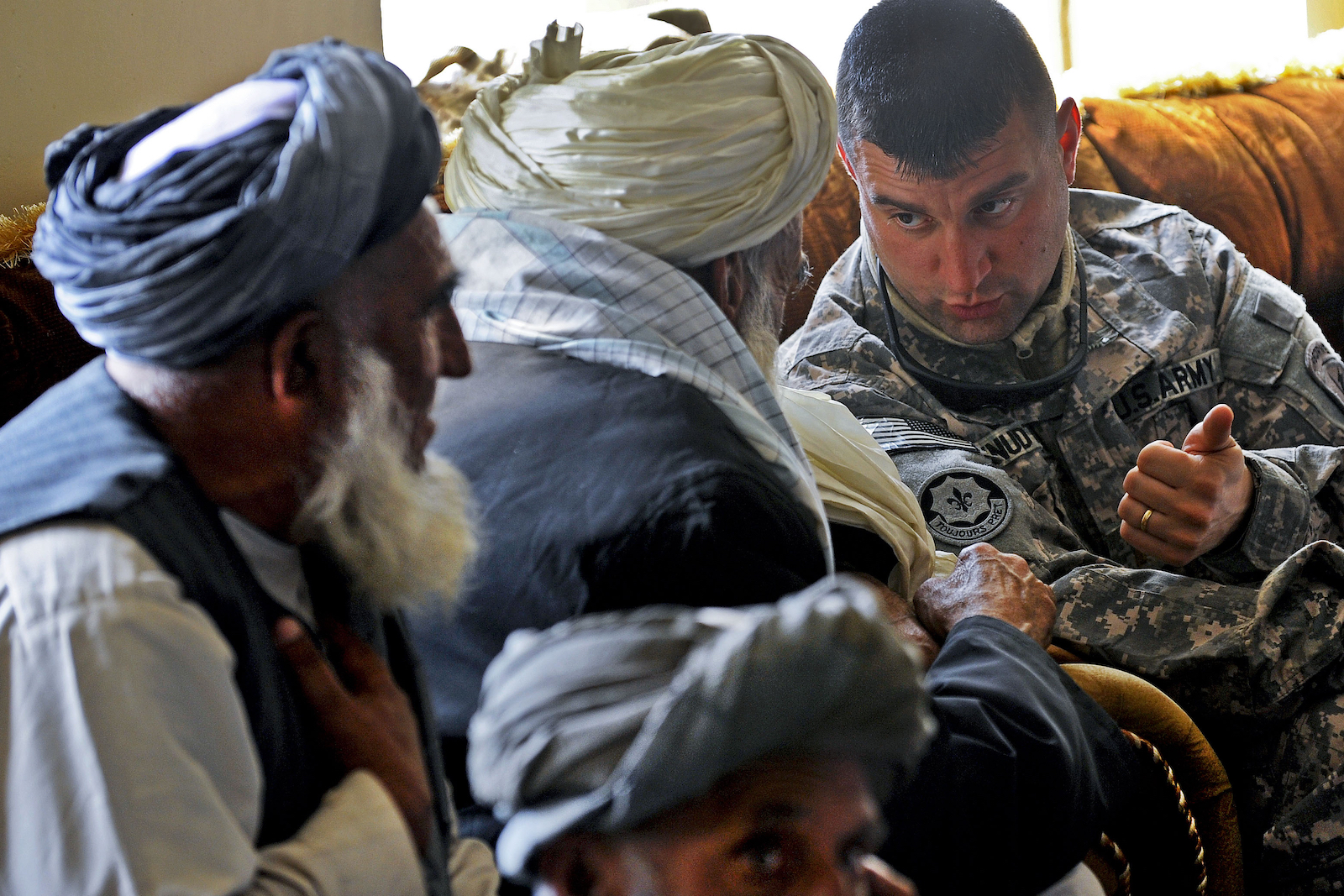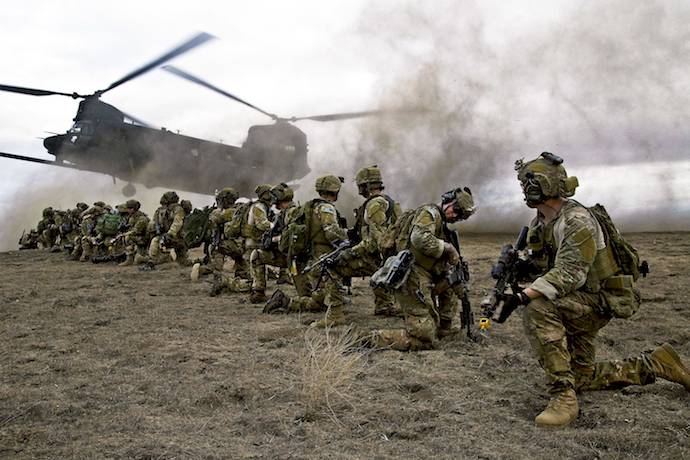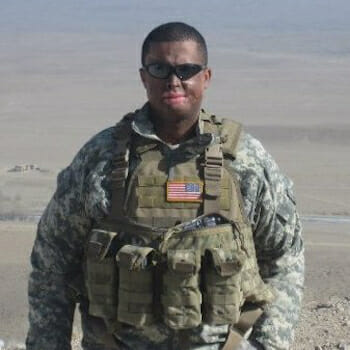
The Iraq and Afghanistan Combat Veteran and the Future of American Foreign Policy
As my parents carefully poured water onto the gauze that stuck to my legs from still largely unhealed burn wounds from an Al-Qaeda in Iraq (AQI) roadside bomb, the pain was excruciating as the blood and puss congealed to the bandage began to loosen and release itself from the one bad night out of the hundreds I spent on dusty Iraqi roads.
This attempt to ease the pain of the gauze separating from my open wounds was repeated on all four of my limbs. The water helped to some degree, but the pain was something that felt like slowly pulling limb sized band-aids from my skin. My parents repeated this routine daily, for their son, whom his entire life had prepared them for this moment, as his lifelong dream of becoming an Army officer in the 101st Airborne Division came true.
It was that fact that I was a 101st Airborne officer that made the pain more bearable, for many others had perished during the division’s 2005-2006 tour in Iraq. The daily excruciating routine was a reminder of how fortunate I was to be alive, but on the day of February 7, 2007, the pain turned into anger as I read a New York Times article titled, “Many U.S. diplomats refuse to work in Iraq” by Helene Cooper.
As I sat there enduring the result of representing America’s Iraq policy at the tip of the spear as an Air Assault Infantry Reconnaissance Platoon Leader I began to wonder how my role as a platoon leader had made it possible for some U.S. Foreign Service Officers to neglect duties of U.S. diplomacy.
Only after this article was published did I realize that the U.S. could only depend on the unquestioned dedication of junior combat arms officers to be responsible for ultimately furthering U.S. foreign policy in Iraq and Afghanistan. This experience at furthering U.S. foreign policy at its lowest levels if fostered by the U.S. government is invaluable for advancement of its foreign policy, especially with America’s increased dialogue with its adversaries at its highest level since the end of the Cold War.
Most of my experience in Iraq as a platoon leader was not in kinetic operations. In my unit’s area of operations insurgent groups such as al Qaeda in Iraq, Revolution 1920, and former Saddam Regime elements, were very active and ever present, but mostly concerned themselves with small ambushes on our patrols, the occasional complex attack, and attacks against the Iraqi security forces and Iraqi civilians. Kinetic activity with the enemy occurred on a daily basis for our unit, but usually lasted no more than a few moments time. Most of our operations were focused on what was called “Sphere of Influence” or SOI operations in Eastern Diyala Province.
These SOI operations were really nothing more than diplomatic missions at the local and district level and being the face of the U.S. government mission in Iraq to the average Iraqi citizen, tribal leaders, and Iraqi government officials at the district level. The most significant missions my platoon and I conducted with Eastern Diyala Iraqi government officials during our tour were assisting in mentoring of Iraqi election officials and security forces in security and voting operations during Iraq’s first ever provincial elections in December 2005.
I had no training in voting operations, negotiation, peace-making, economic development, or representing American foreign policy, but my position as a infantry platoon leader demanded I “hold the line” at these tasks as the U.S. and Iraqi government figured out an effective strategy against the increasing insurgency. As a 23-year old 2nd Lieutenant I was responsible for ensuring that the message of the administration was presented to the Iraqi government and populace at the lowest level as presented from the President to the Department of Defense and down the line to our subordinate unit’s “talking points.”

I was the face of the U.S. Army and the U.S. Government to thousands of Iraqis in Eastern Diyala Province on a daily basis. My subordinate leaders and I reminded our soldiers that although these people could kill us at any moment, we had a responsibility as individual soldiers to ensure we upheld the honor and integrity of the uniform we wore and the country we served. Post 9/11 an individual soldier could do more damage to both U.S. war efforts and U.S. international relations than any single U.S. Foreign Service Officer in the world.
That damage could not only endanger the U.S. ability to further its foreign policy around the world, but could cost American, Iraqi, and even our own lives. We came face to face with leaders in the insurgent movement, yet we held our nerve, controlled our emotions, and negotiated for peace and stability in our area, despite knowing the very people we negotiated with would give orders for their groups to conduct attacks on us and their fellow Iraqi citizens without mercy. There was no school that could prepare us for this.
Despite the lack of training, we, as combat arms officers, continued to execute at a high level, without letting our emotions get the best of us, and treated our adversaries with respect in between their trying to kill us. Despite my youth and lack of foreign relations training, I felt as though I was pretty good at this, but my efforts also lacked due to that fact. After all, I was ultimately concerned with finding the enemy and destroying him. This is why I joined the Army and why I volunteered for a combat arms branch. I volunteered to engage and be engaged by the enemy in close combat, not to negotiate with local leaders, survey for civil service projects, and serve as a spokesperson for the U.S. government in a diplomatic sense.
Only during my recovery from wounds would I find myself proud of my efforts in negotiation and peace making. Ultimately, these efforts proved to be the most important, and most rewarding, aspects of our tour. I felt as though I didn’t at least create more enemies in my area of operations during my tour. Also, I believe we discouraged a few Iraqis from conducting more attacks and reinforced American resolve to securing Iraq. Those expectations were really the best a young platoon leader could hope for in Iraq in 2005-2006.
Disappointed that U.S. Foreign Service officers had not been there to guide us or take the lead role of negotiating with local leaders, I felt as though we represented the State Department at the local level, so that the U.S. military might have had an easier time pacifying the insurgency. It was clear to us at the time the insurgency was fueled mostly at the local level, not at the national level. This fact was proven true when grassroots groups, such as the Awakening Councils and the Sons of Iraq, emerged in 2007 and pushed back the insurgency, one village, district, and ultimately province at a time. It was only in 2010, during my tour as an intelligence officer in Afghanistan, that I saw U.S. State Department representation at the local level.
Through my limited experience with the State Department representative, I still failed to see where the foreign policy at the local level was being influenced by officials professionally trained in diplomacy. The lead for the administration still rested on the shoulders of Lieutenants and Captains in their early to mid-twenties, with the bulk of the diplomatic ground work still being done by the Lieutenants on their first tour of duty to a war zone. U.S. Army Captain Giles H. Wright, a Combined Arms Company Commander currently serving in Afghanistan commented, “As a Combined Arms Company Commander in Eastern Paktika, Afghanistan, it is alone my responsibility in my area of operations to understand not only tribal politics in my area, but regional and national politics as well. Furthermore, I understand the concerns of district and regional leaders, and how I am to address them, when on most occasions, I am the senior government representative at the table and how to work through those issues to create favorable second and third order effects for the coalition.”
The U.S. State Department in my experience in Iraq and Afghanistan, appeared to be reluctant to involve itself at such low-levels, even though the largest pay-off for the U.S. effort in Iraq and it could be argued also so far in Afghanistan, was and is with the influence of local leaders and a bottom-up approach to solving arguably the U.S.’s greatest national challenge since Vietnam and the end of the Cold War. It could be argued that for the future of American international relations and foreign policy, the veteran, especially the Company Grade Infantry and Armor officer who spent most of his time with the populace, is best suited for the intricate challenges of furthering American policy in a post-war world.
My experiences were not unique as an American combat arms platoon leader in Iraq, but the norm for the majority of veteran’s that served as combat arms platoon leaders and company commanders in Iraq or Afghanistan. The on-the-job training in diplomacy in a hostile environment that these junior officers obtained in Iraq and Afghanistan is something the U.S. will need to take advantage of for the future. Especially as the world continues to become smaller, relationships more complex with globalization and the U.S. learning it can no longer isolate itself from its adversaries.
Having been thrown into the chaotic situations of Iraq and Afghanistan and having succeeded in weathering the storm, combat veterans can be depended upon to serve the foreign policy interests of the United States around the world, in any environment, despite the challenges or security concerns, and can be depended upon to maintain composure despite the situation. The future of American foreign policy depends on strengthening relationships with its allies and more importantly America’s adversaries in order to further American foreign policy. It is the American veteran combat officers who have proved above all, that they are up to the challenge in the post-Iraq and Afghanistan war world.

